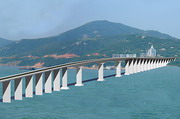Cross-Straits passenger liner carries more than 100,000
( Xinhua )
Updated: 2012-11-29
|
|||||||||
A high-speed passenger liner across the Taiwan Straits has carried more than 100,000 people since it began operation last November, a spokesman said Nov 28.
The passenger liner named Haixia has played a constructive role in facilitating cross-Straits travels and improving exchanges, Yang Yi, spokesman with the State Council Taiwan Affairs Office, told a press conference in Beijing.
The liner links the city of Taichung in Taiwan and Pingtan county in Fujian Province in the mainland.
"The mainland is glad to see further improvement of cooperation in shipping service across the Straits," Yang said.
The Haixia can carry 760 passengers and 260 cars.
The mainland has become the largest source of tourists for the island since the two sides lifted the ban on tourists across the Taiwan Straits in July, 2008.
The number of mainland tourist arrivals totaled 1.45 million in the first three quarters of the year, up 73.6 percent over the same period in 2011.
To facilitate travels, mainland police eased restrictions in applying for a Taiwan travel pass in six big cities in September.
People who work or study at higher education institutions in Beijing, Tianjin, Shanghai, Chongqing, Guangzhou and Shenzhen are allowed to apply for a travel pass, even if they do not hold household registrations in these six cities.
Most mainland residents must apply for a Taiwan travel pass to police in the area where they hold a household registration.
This has caused problems for people who leave their hometown but do not transfer their household registration location.
The policy is being applied in the six cities because they have a large inflow of people, Yang said.
When commenting on the complaints from Taiwan travel agencies about their mainland partners defaulting on payment of cross-Straits travels, Yang admitted that such behavior did occur but not very often.
He pledged that the mainland tourism watchdog will work to regulate the industry and punish those intentionally defaulting payment.






